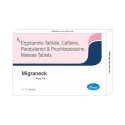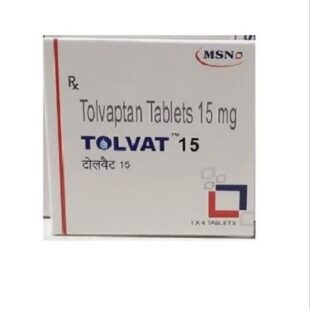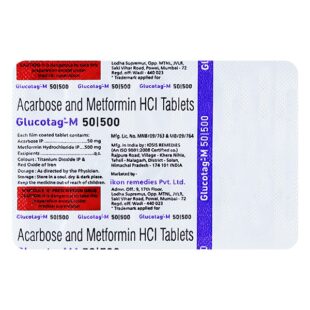- Your cart is empty
- Continue Shopping
Migraneck Tablet
Caffeine, Ergotamine, Paracetamol, Prochlorperazine
₹120.00
Uses of Migraneck Tablet
- Migraine
Add to cart
Buy Now
Introduction to Migraneck Tablet
Migraneck Tablet is a medicine used to prevent and treat migraine. It blocks the release of certain chemical messengers that cause pain and inflammation. It also blocks the signals in the brain that cause nausea and vomiting associated with migraine.
Migraneck Tablet should be taken with food. This will prevent you from getting an upset stomach. The dose and duration will depend on what you are using it for and how well it helps your symptoms. Use it regularly and do not discontinue using it until the doctor tells you it is alright to stop.It may cause side effects like sedation, orthostatic hypotension (sudden lowering of blood pressure on standing), drowsiness, urinary retention, and dryness in mouth in some patients. If you experience any of such side effects that do not go away or get worse, you should let your doctor know. Your doctor may be able to suggest ways of preventing or reducing the symptoms. In general, you should try to use the smallest amount necessary to control your symptoms.Before using the medicine, you should tell your doctor if you have any other illnesses or disorders. It may also affect, or be affected by, some other medicines you are using so let your doctor know all the other medicines you are taking. It should be used with caution in patients who are alcoholic or have liver or kidney disease. Pregnant and breastfeeding women should consult their doctors first before using the medicine.
Migraneck Tablet should be taken with food. This will prevent you from getting an upset stomach. The dose and duration will depend on what you are using it for and how well it helps your symptoms. Use it regularly and do not discontinue using it until the doctor tells you it is alright to stop.It may cause side effects like sedation, orthostatic hypotension (sudden lowering of blood pressure on standing), drowsiness, urinary retention, and dryness in mouth in some patients. If you experience any of such side effects that do not go away or get worse, you should let your doctor know. Your doctor may be able to suggest ways of preventing or reducing the symptoms. In general, you should try to use the smallest amount necessary to control your symptoms.Before using the medicine, you should tell your doctor if you have any other illnesses or disorders. It may also affect, or be affected by, some other medicines you are using so let your doctor know all the other medicines you are taking. It should be used with caution in patients who are alcoholic or have liver or kidney disease. Pregnant and breastfeeding women should consult their doctors first before using the medicine.
Side effects of Migraneck Tablet
Most side effects do not require any medical attention and disappear as your body adjusts to the medicine. Consult your doctor if they persist or if you’re worried about them
Common side effects of Migraneck
- Dryness in mouth
- Constipation
- Sedation
- Orthostatic hypotension (sudden lowering of blood pressure on standing)
- Drowsiness
- Urinary retention
- Increased heart rate
- Muscle pain
How to use Migraneck Tablet
Take this medicine in the dose and duration as advised by your doctor. Swallow it as a whole. Do not chew, crush or break it. Migraneck Tablet is to be taken with food.
How Migraneck Tablet works
Migraneck Tablet is a combination of caffeine, ergotamine, paracetamol, and prochlorperazine. Ergotamine constricts blood vessels in the brain, reducing migraine pain caused by dilation. Caffeine enhances this effect by boosting ergotamine’s action. Paracetamol provides pain relief, while prochlorperazine helps control nausea and vomiting, which are common migraine symptoms. Together, these components work to alleviate headache pain and associated symptoms.
Safety advice
Alcohol
Unsafe
It is unsafe to consume alcohol with Migraneck Tablet.
Pregnancy
Unsafe
Migraneck Tablet is highly unsafe to use during pregnancy. Seek your doctor’s advice as studies on pregnant women and animals have shown significant harmful effects to the developing baby.
Breast feeding
Consult your doctor
Migraneck is probably unsafe to use during breastfeeding. Limited human data suggests that the drug may pass into the breastmilk and harm the baby.
Occasional short-term use of Migraneck for the treatment of nausea and vomiting poses little risk to the breastfed infant.
Occasional short-term use of Migraneck for the treatment of nausea and vomiting poses little risk to the breastfed infant.
Driving
Unsafe
Migraneck may decrease alertness, affect your vision or make you feel sleepy and dizzy. Do not drive if these symptoms occur.
Kidney
Consult your doctor
Migraneck should be used with caution in patients with kidney disease. Dose adjustment of Migraneck Tablet may be needed.
Liver
Consult your doctor
Migraneck should be used with caution in patients with liver disease. Dose adjustment of Migraneck Tablet may be needed.








Reviews
There are no reviews yet.